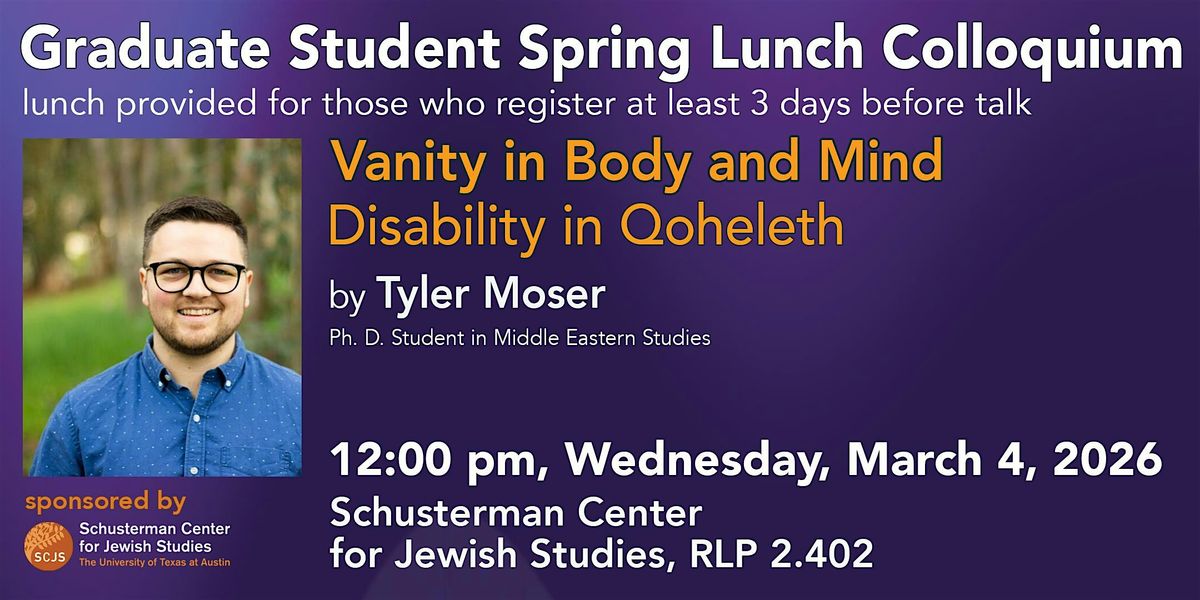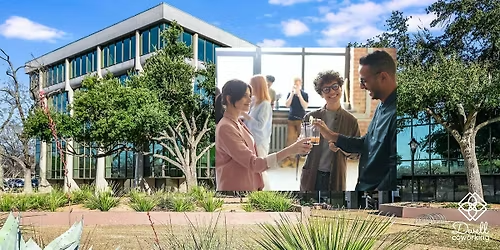"Vanity in Body and Mind: Disability in Qoheleth” by Tyler Moser
Schedule
Wed Mar 04 2026 at 12:00 pm to 01:00 pm
UTC-06:00Location
Schusterman Center for Jewish Studies, Patton Hall (RLP) 2.402 | Austin, TX

About this Event
The growing scholarly interest in the body––and the disabled body––in biblical literature has produced many studies of texts and corpora over the past couple decades. A relatively underdiscussed book within this burgeoning field has been the book of Qoheleth (Ecclesiastes). Like its counterparts in the so-called ‘wisdom literature,’ Qoheleth exhibits an interest in the body, sense-experience, and bodily imagery as it advances its message. This paper considers the various ways in which Qoheleth constructs its sensorium as it relates to the body and disability. Approaching the text from an emic perspective, I trace the bodily and sensory references in Qoheleth with an eye to how it reflects Normate assumptions about the human body and uses these references to construct an understanding of wisdom and folly. Building on Hector Avalos’ notion of sensory-criticism, which aims to understand how literary texts value the senses and in what ways they value or devalue human beings based on perceived physical or mental features in relation to those sensorial values, I then consider the valuation of the body and the senses in Qoheleth, finding that Qoheleth displays a rather skeptical outlook on the value of the senses yet often employs the sensory imagery as a metaphor for wisdom and knowledge in its discourse. To know is to see, according to Qoheleth, and to see is to be wise. This negotiation of the senses and its relation to the mind raises questions about cognitive ability and Qoheleth’s language of “folly and madness.” What does it mean to be foolish, according to Qoheleth, and how does folly fit within Qoheleth’s sensorial framework? I suggest that Qoheleth stigmatizes folly within a rhetorical strategy that associates it with bodily and cognitive deficiency, even as it openly and critically questions the value of wisdom. Qoheleth, I argue, presents a complex mosaic of wisdom and folly, using the body-mind and disability as a vehicle to not only stigmatize but also to promote particular ways of thinking and living.
Tyler Moser is a 5th year doctoral student in the department of Middle Eastern Studies. He focuses on the disabled bodymind in ancient Israelite literature, and also has interests in reception history and comparative research. His dissertation will focus on representations of disability within the didactic literature of the Hebrew Bible.
This talk is an Israel Studies Fellow Colloquium, and part of the Graduate Student Lunch Colloquium Series.
Lunch provided for those who RSVP by Monday, March 2.
Where is it happening?
Schusterman Center for Jewish Studies, Patton Hall (RLP) 2.402, 305 E. 23rd Street, Austin, United StatesEvent Location & Nearby Stays:
USD 0.00




















